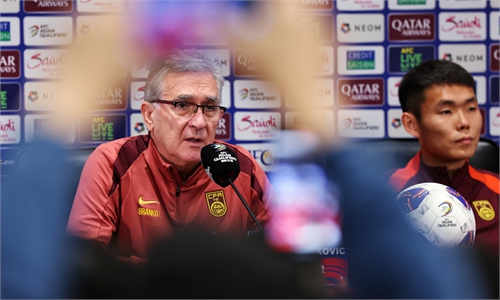ARTS / CULTURE & LEISURE
Wuhan win ignites hope for revival of women’s football

Illustration: Liu Xiangya/GT
Thanks to a goal from forward Wang Shuang and more critically substitute goalkeeper Chen Chen, Chinese Women's Super League (CWSL) giants Wuhan Jiangda won the Asian Women's Champions League title by defeating Melbourne City 5-4 in a penalty shootout in extra time after a 1-1 draw on Saturday night.
Wuhan's victory is unprecedented in Chinese women's football as it shined a rare spotlight onto domestic women's football amid the national team's underachieving run since 2022.
Their win also makes China the only country to claim both the men's and women's Asian Champions League title after Guangzhou FC claimed the men's intra-continental event in 2013 and 2015.
Jiangda refers to Jianghan University in Wuhan, Central China's Hubei Province, as the club was founded by the university with the local football association in 2001. The now-professional club still has links with the university as several of the team players have graduated from the university.
Their journey to the championship was not as assured as it looked, as they were close to an early elimination in the group stage. But they managed to bounce back from the slow start in the group stage, including losses to the Abu Dhabi Country Club and Incheon Red Angels, to demonstrate their tactical adaptability and mental fortitude, particularly in the quarterfinal match against Japanese powerhouse Urawa Red Diamonds and eventual final against Melbourne City.
Central to Wuhan's success is their embodiment of the "Steel Roses" ethos, an unyielding fighting spirit that defines Chinese women's football. In the final, Wang Shuang's 98th-minute penalty to equalize and force extra time and substitute goalkeeper Chen's two crucial saves in the shootout encapsulated this resilience.
The team's ability to thrive under pressure, evident in two penalty shootout victories during the knockout stage, reflects a collective determination forged through years of adversity that have earned the Chinese women's footballers the nickname "Steel Roses." The squad's depth and leadership were equally vital. Captain Yao Wei, playing through injury, led by example, while veterans like defender Wu Haiyan displayed relentless grit.
"There is no perfect individual, only a perfect team. We've made it happen, allowing the world see what we're capable of," Wang posted on social media on Sunday. "For ourselves and the future of women's football, we've run and fought with every ounce of our strength, defending with all our hearts to keep the honor right here at home, in China. This victory inspires everyone who has cared for and supported us."
Wuhan's victory was fueled by an electrifying home atmosphere. A record 18,715 fans packed the Wuhan Sports Center, their chants and renditions creating an intimidating environment for Melbourne City. This support is rooted in Wuhan's decades-long commitment to women's football. The city's youth development pipeline, exemplified by local schools and Jianghan University's integrated sports-education model, has nurtured talents like Wang and Yao.
While Wuhan's triumph is cause for celebration, it also highlights systemic challenges facing Chinese women's football. The CWSL, despite producing a continental champion, remains underfunded and underexposed compared to their male counterpart Chinese Super League. Many players earn as little as a few thousand yuan monthly, far below their male counterparts. Commercialization efforts, though growing, still lag behind the men's leagues.
Policy support is critical to addressing these gaps. The National Women's Football Reform and Development Plan (2022-35) outlines ambitious goals, including expanding the CWSL to 12 teams by 2025 and establishing 30 youth training centers. Wuhan's success demonstrates the potential of such initiatives, but sustained investment - both financial and institutional - is needed to build a self-sustaining ecosystem. This includes improving player welfare, enhancing league infrastructure, and fostering corporate partnerships.
Under the rules issued by the Chinese Football Association (CFA), any club in the CWSL can only have as many as five Chinese national team players. This limited Wuhan to strengthening their squad depth by signing more national team players, but also paved the way for young players to emerge into the senior team. The players' performances in the Champions League highlight the importance of club-level development in nurturing talent and building a robust national team pipeline.
Wuhan's victory has already inspired a new generation. The sight of young players from local academies cheering in the stands during the final underscores the power of role models. With a spot in the inaugural FIFA Women's Club World Cup, Wuhan will take on global women's football elites, offering invaluable exposure and learning opportunities for themselves.
Rumor has it that the CFA is mulling for a bid to host the Women's Club World Cup in the future, Wuhan's triumph serves as a reminder of what can be achieved with dedication and vision. To build on this momentum, policymakers should continue to prioritize youth development as well as the commercialization of women's football. Only by addressing these challenges can China transform its women's football into a globally competitive force, ensuring that the "Steel Roses" continue to bloom for decades to come.
The author is a reporter with the Global Times. life@globaltimes.com.cn



